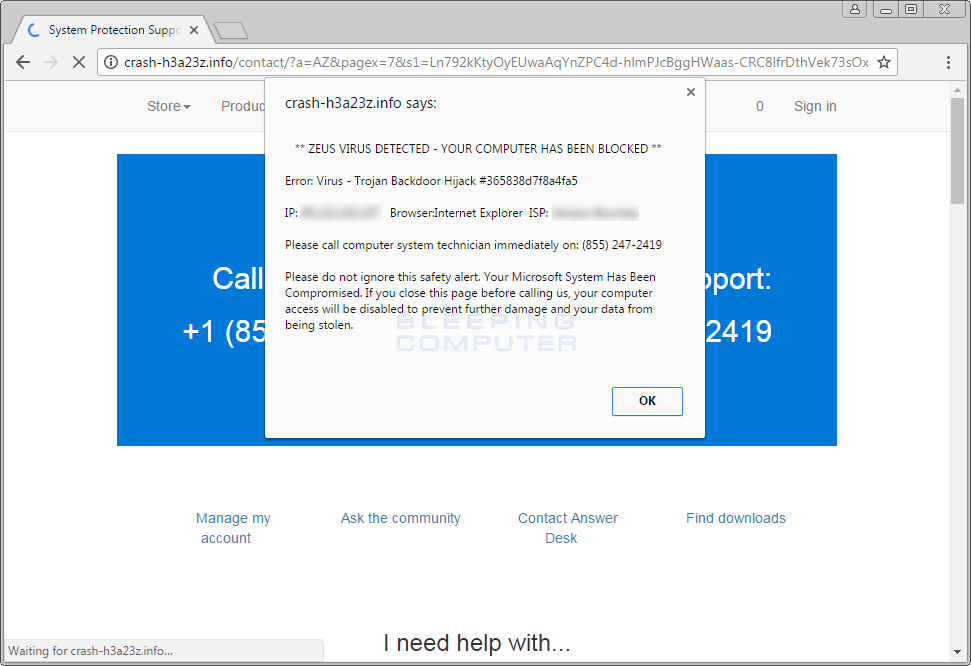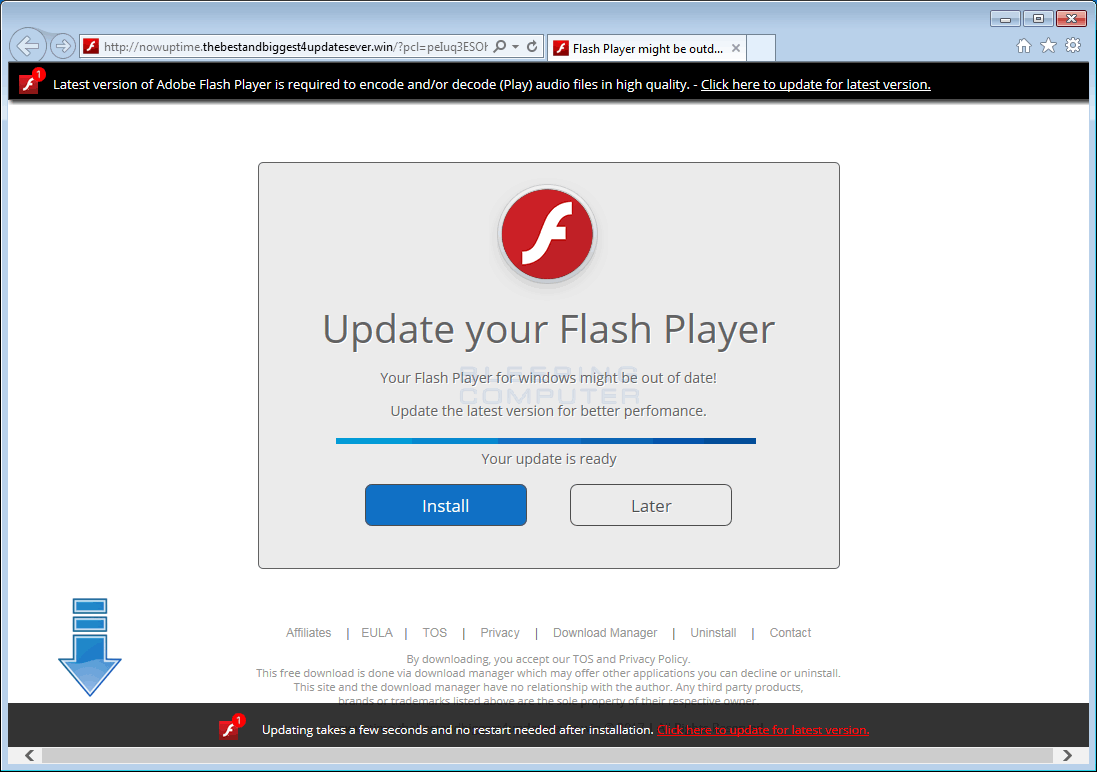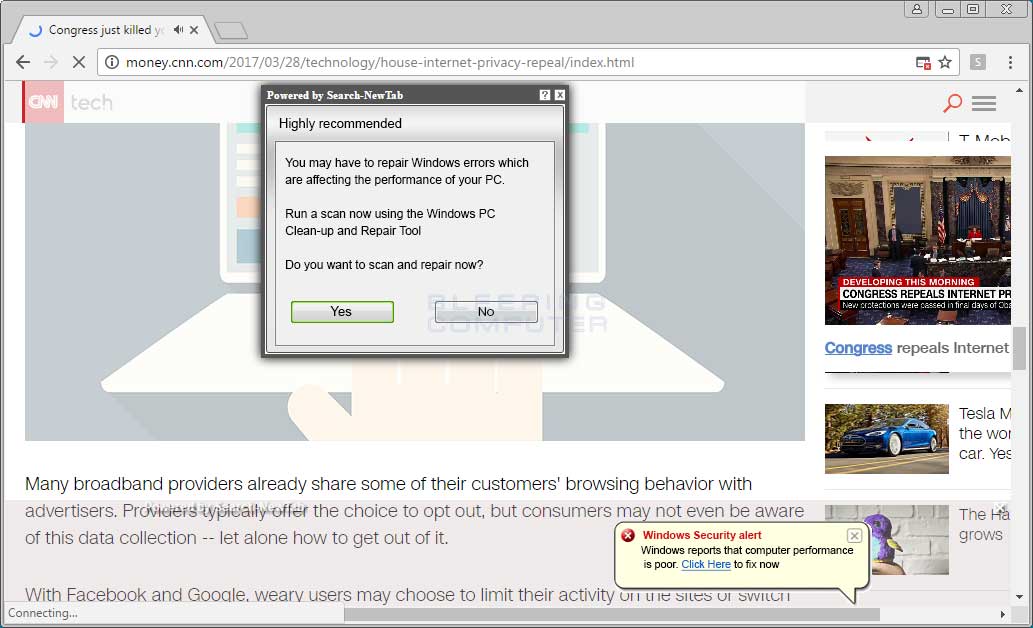If you are constantly seeing popups, advertisements on sites where their shouldn't be, or tech support scams then you are most likely infected with Adware. One of the biggest problems facing computers users is the growing rise of and problems with removing Adware programs. While adware has always been a problem, in the past these programs typically displayed a popup advertisement here and there or displayed advertisements within their own programs, but could be fairly easy to remove.
The current trend, though, is adware that has become more aggressive and displays constant streams of popups, injects advertisements into web sites, and adds their own ads into search result pages. This type of behavior can prevent the proper browsing of the web or using web sites. Even worse, they design the adware to make it extremely difficult to remove or not include any uninstall method at all.
For example, in the images below you can see adware programs that are injecting advertisements so that they overlay the content of web pages or displaying ads for malware. This makes browsing the web more of a chore than a useful and enjoyable activity.
Another major issues with adware is that some of them also install their own root certificates into Windows so that they can inject advertisements into secure SSL (https://) sites. What's worse is that by using their own root certificates, it also allows adware programs to view anything that is sent to a remote site. This includes passwords, banking credentials, credit card details, or anything else that you may think is secure because you are using a SSL connection.
You can see an example of this type of issue in the image below where an adware program uses their own root certificate to sign the certificate being used by the IRS.gov site. This essentially means that they can listen in on anything you submit to the IRS site.
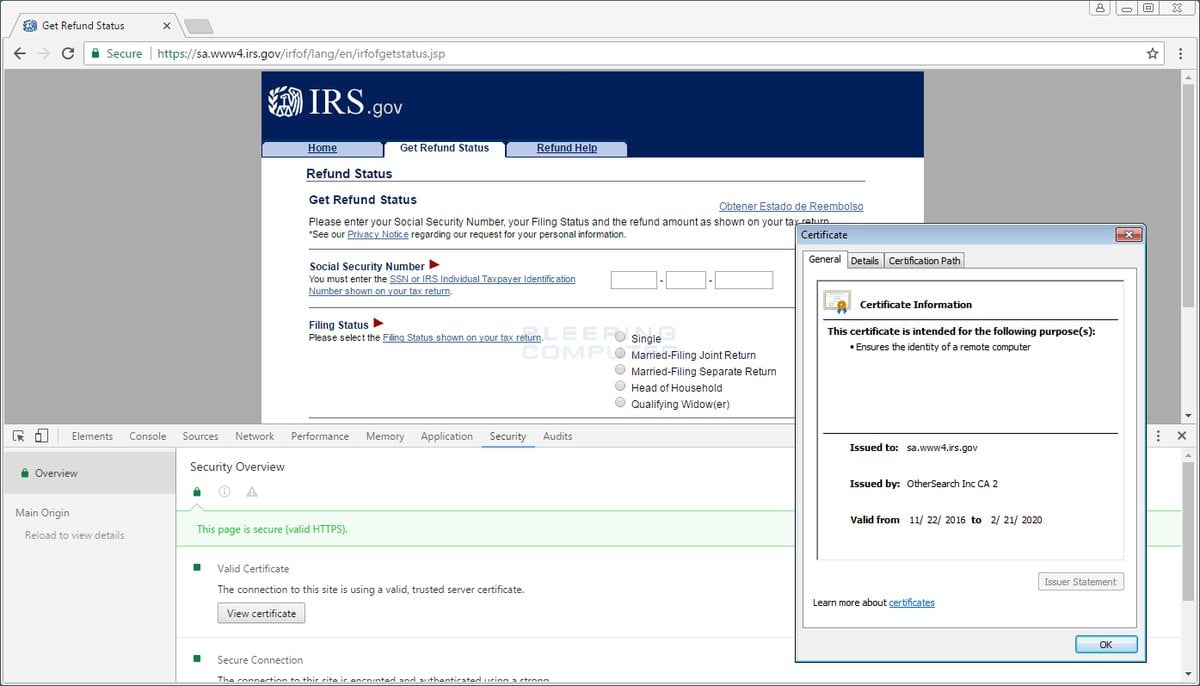
As you can see, the main goal of Adware has become to display advertisements in any way possible. Even if this means that they break the security of the computer. For this reasons, it must be a priority that users keep an updated security program installed on their computer, perform routine scans, and remove any adware that is found.
What are the Most Common Symptoms of Adware?
While not all adware programs are the same, for the most part they exhibit the same behavior. Below is a list of symptoms that users may encounter when infected with an adware program:
- Your browser opens on its own and displays advertisements for adult sites, adult web games, tech support scams, unwanted browser extensions, fake java updates, and fake flash player updates.
- Advertisements will be injected into web sites that you are viewing. These advertisements may overlay the existing content so you can't read the web page, or replace existing advertisements. Some adware programs also inject Russian advertisements, even for those who are browsing sites that are clearly in another language. These advertisements may not be labeled or could be labeled with words like powered by, ads by, ad by, ads from, etc.
- When browsing online merchants such as Amazon, Best Buy, Target, Ebay, etc, adware will display advertisements that show deals or pricing comparisons at other sites.
- SSL certificates for banks or well known sites will show that the certificate was issued by a strange company, like in the image above.
How is Adware installed on a Computer?
Adware is commonly installed by free programs that you download from the Internet. These free programs are either programs that were designed solely as a vehicle to distribute adware or by developers who want to earn revenue from their software. When someone downloads and installs these free programs, adware and other unwanted programs will be installed as well. Therefore, it is important that you pay close attention to license agreements and installation screens when installing anything off of the Internet.
Below you can see an installer that was created to install the legitimate Flash Player, but only after installing a lot of unwanted software on the computer.
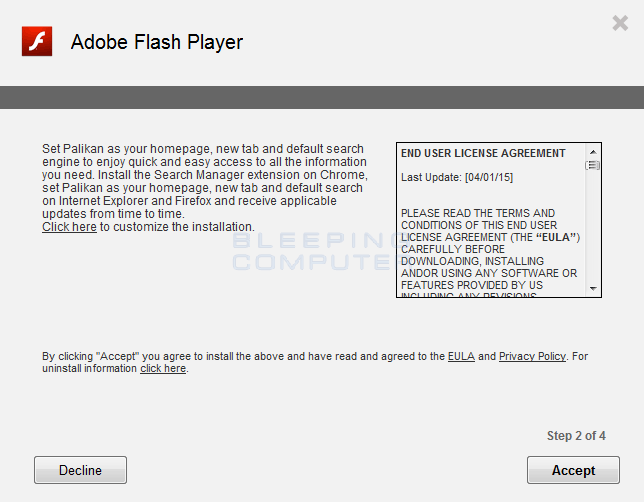
That is why it is important to pay close attention to what installers are doing when you install something from the Internet. Also, if an installation screen offers you Custom or Advanced installation options, it is a good idea to select these as they will typically disclose what other 3rd party software will also be installed. Furthermore, If the license agreement or installation screens state that they are going to install a toolbar or other unwanted adware, it is advised that you immediately cancel the install and not use the free software.
Below I have written a guide that pretty much throws the kitchen sink at your computer. I did this there is not one particular software that can remove every bad program out there. By utilizing a myriad of free programs, you will have enough coverage to remove almost everything that may be bad on the computer. Furthermore, these steps will have you reset your browsers back to their default settings in order to remove extensions, addons, toolbars, and other unwanted browser programs.
Adware Removal Options
Self Help Guide
If you are uncomfortable making changes to your computer or following these steps, do not worry! Instead you can get free one-on-one help by asking in the forums.
To remove Adware, follow these steps:
- STEP 1: Print out instructions before we begin.
- STEP 2: Use Rkill to terminate suspicious programs.
- STEP 3: Use Malwarebytes AntiMalware to Scan for Malware and Unwanted Programs
- STEP 4: Scan and clean your computer with Emsisoft Anti-Malware
- STEP 5: Scan and clean your computer with Zemana AntiMalware.
- STEP 6: Use AdwCleaner to remove adware from a computer.
- STEP 7: Reset browsers back to default settings.
- STEP 8: Run Secunia PSI to find outdated and vulnerable programs.
This removal guide may appear overwhelming due to the amount of the steps and numerous programs that will be used. It was only written this way to provide clear, detailed, and easy to understand instructions that anyone can use to remove this infection for free. Before using this guide, we suggest that you read it once and download all necessary tools to your desktop. After doing so, please print this page as you may need to close your browser window or reboot your computer.
To terminate any programs that may interfere with the removal process we must first download the Rkill program. Rkill will search your computer for active malware infections and attempt to terminate them so that they wont interfere with the removal process. To do this, please download RKill to your desktop from the following link.

Rkill
When at the download page, click on the Download Now button labeled iExplore.exe. When you are prompted where to save it, please save it on your desktop.
Once it is downloaded, double-click on the iExplore.exe icon in order to automatically attempt to stop any processes associated with Adware and other malware. Please be patient while the program looks for various malware programs and ends them. When it has finished, the black window will automatically close and a log file will open. Please review the log file and then close so you can continue with the next step. If you have problems running RKill, you can download the other renamed versions of RKill from the rkill download page. All of the files are renamed copies of RKill, which you can try instead. Please note that the download page will open in a new browser window or tab.
Do not reboot your computer after running RKill as the malware programs will start again.
Once downloaded, close all programs and Windows on your computer, including this one.
Double-click on the icon on your desktop named MBSetup-1878.1878-4.0.exe. This will start the installation of MBAM onto your computer.
When the installation begins, keep following the prompts in order to continue with the installation process. Do not make any changes to default settings and when the program has finished installing, a welcome screen will be displayed.
At this screen, click on the Get Started button where you will be prompted to buy and activate a license. To continue using it for free, click on the 'Maybe Later' option and then select 'Use Malwarebytes Free'.
It should be noted that the free version will scan for and remove malware, but not provide real-time protection from threats that occur when not performing a scan.
Finally, you will be shown a screen asking you to sign up for their newsletter. Just click on the 'Open Malwarebytes Free' option to start the program.
MBAM will now start and you will be at the main screen as shown below.
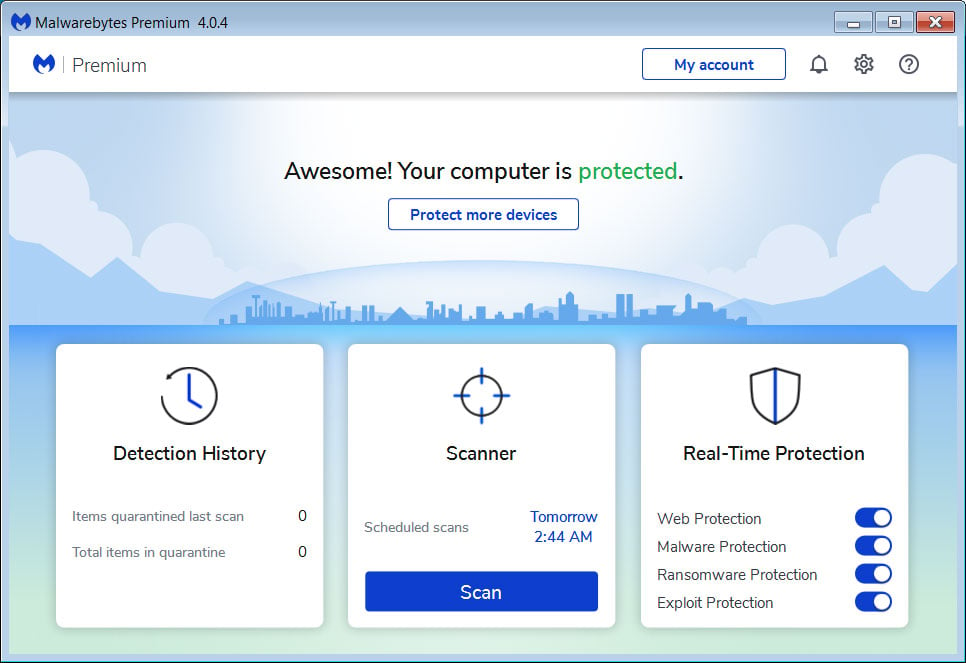
We now need to enable rootkit scanning to detect the largest amount of malware and unwanted programs that is possible with MalwareBytes. To do this, click on the Settings gear on the top left side of the screen and you will be brought to the general settings section.
Now click on the Security option at the top of the screen. You will now be shown the settings MalwareBytes will use when scanning your computer.
Scroll down until you see Scan option as shown below.
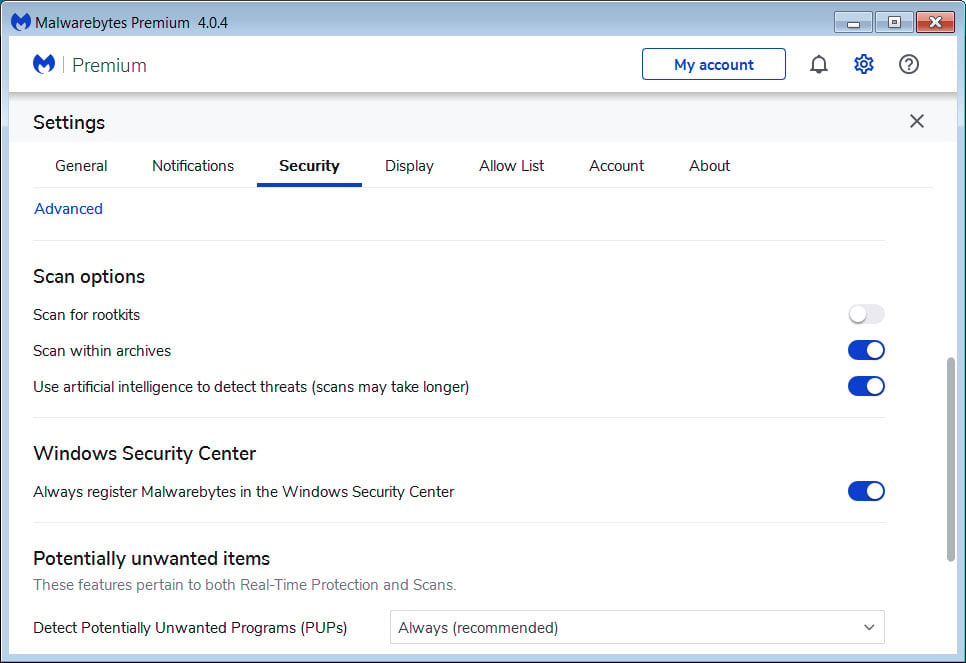
At this screen, please enable the Scan for rootkits setting by clicking on the toggle switch so it turns blue.
Now that you have enabled rootkit scanning, click on the X button to close the settings to get back to the main screen.
You should now click on the Scan button to begin scanning your computer for malware.
This process can take quite a while, so we suggest you do something else and periodically check on the status of the scan to see when it is finished.
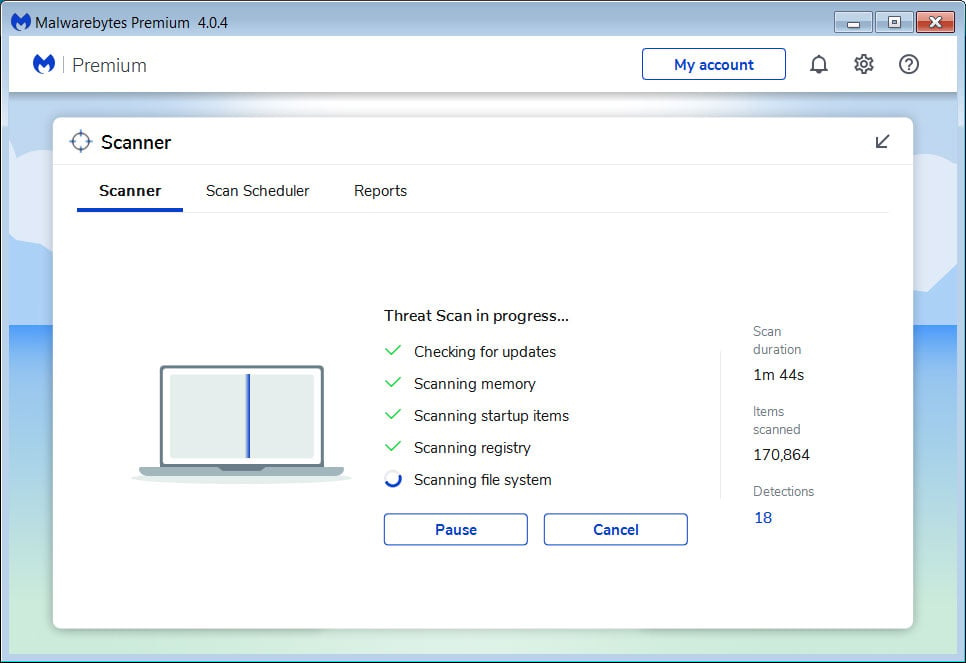
When MBAM is finished scanning it will display a screen that displays any malware, adware, or potentially unwanted programs that it has detected. Please note that our guide's scan results image may look different than the one you are shown in this version of Malwarebytes as it was created with an older version.
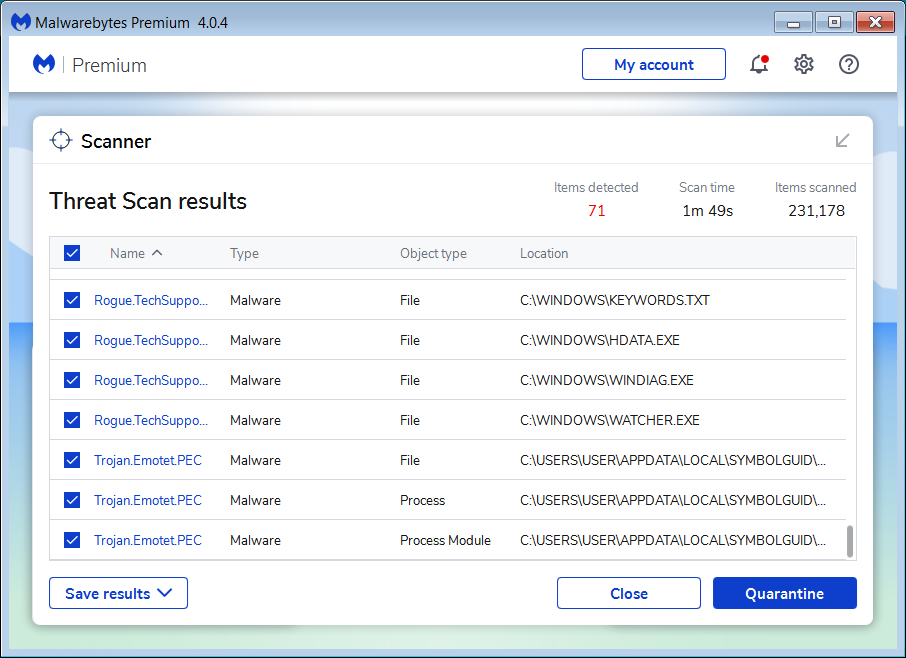
You should now click on the Quarantine button to remove all the selected items. MBAM will now delete all of the files and registry keys and add them to the program's quarantine.
When removing the files, MBAM may require a reboot in order to remove some of them. If it displays a message stating that it needs to reboot, please allow it to do so. Once your computer has rebooted, and you are logged in, please continue with the rest of the steps.
You can now exit the MBAM program.
Now please download Emsisoft Anti-Malware, which will scan for and remove any other adware that may have been bundled with this adware. Please download and save the Emsisoft Anti-Malware setup program to your desktop from the link below:

Emsisoft Anti-Malware
The download is fairly large, so please be patient while it downloads.
Once the file has been downloaded, double-click on the EmsisoftAntiMalwareSetup_bc.exe icon to start the program. If Windows Smart Screen issues an alert, please allow it to run anyway.
If the setup program displays an alert about safe mode, please click on the Yes button to continue. You should now see a dialog asking you to agree to a license agreement. Please access the agreement and click on the Install button to continue with the installation.
You will eventually get to a screen asking what type of license you wish to use with Emsisoft Anti-Malware.
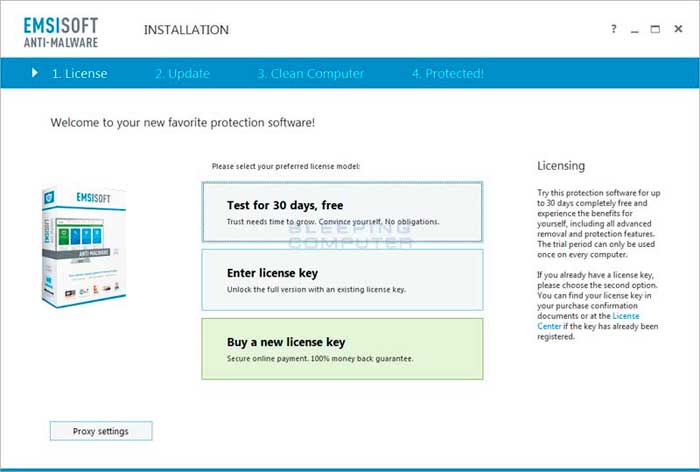
If you have an existing license key or want to buy a new license key, please select the appropriate option. Otherwise, select the Freeware or Test for 30 days, free option. If you receive an alert after clicking this button that your trial has expired, just click on the Yes button to enter freeware mode, which still allows the cleaning of infections.
You will now be at a screen asking if you wish to join Emsisoft's Anti-Malware network. Read the descriptions and select your choice to continue.
Emsisoft Anti-Malware will now begin to update it's virus detections.
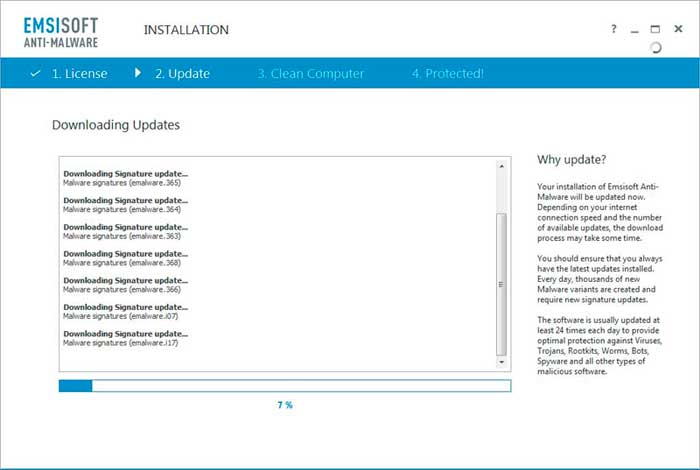
Please be patient as it may take a few minutes for the updates to finish downloading.
When the updates are completed, you will be at a screen asking if you wish to enable PUPs detection. We strongly suggest that you select Enable PUPs Detection to protect your computer from nuisance programs such as toolbars and adware.
You will now be at the final installation screen. Please click on the Finish Installation button end the setup and automatically launch Emsisoft Anti-Malware.
Emsisoft Anti-Malware will now start and display the start screen.
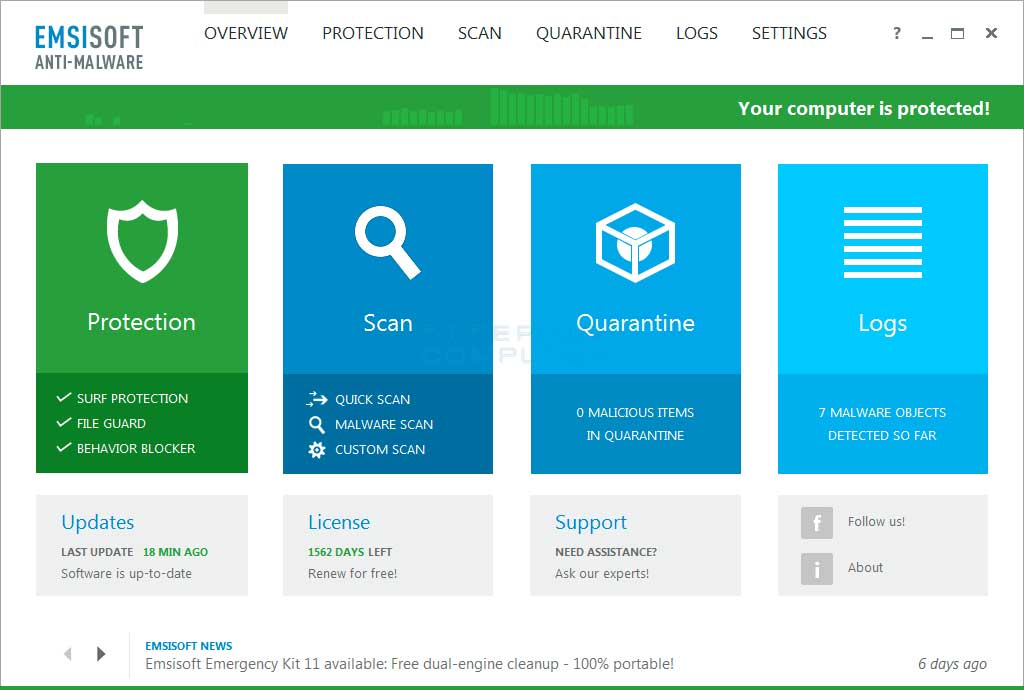
At this screen, please left-click on the Scan section.
You will now be at a screen asking what type of scan you would like to perform.
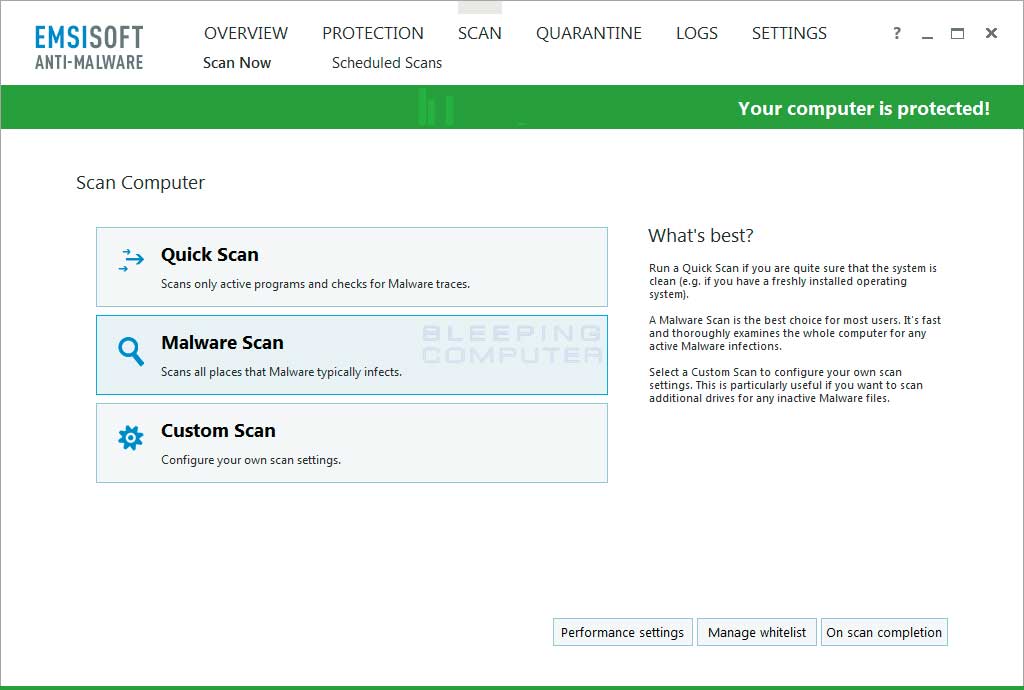
Please select the Malware Scan option to begin scanning your computer for infections. The Malware Scan option will take longer than the Quick Scan, but will also be the most thorough. As you are here to clean infections, it is worth the wait to make sure your computer is properly scanned.
Emsisoft Anti-Malware will now start to scan your computer for rootkits and malware. Please note that the detected infections in the image below may be different than what this guide is for.
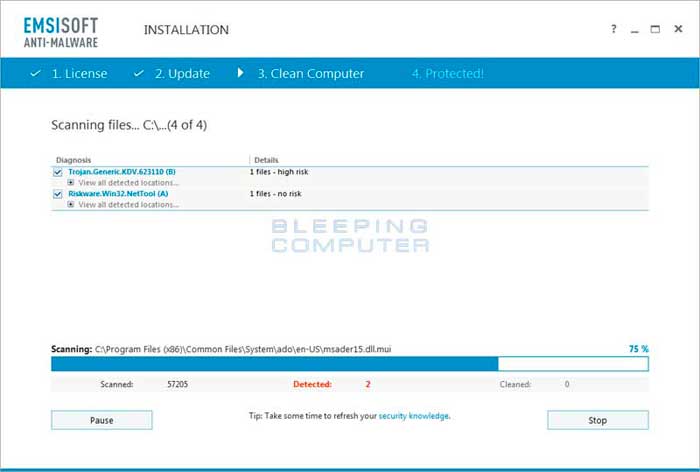
Please be patient while Emsisoft Anti-Malware scans your computer.
When the scan has finished, the program will display the scan results that shows what infections where found. Please note, due to an updated version of Emsisoft Anti-Malware, the screenshot below may look different than the rest of the guide.
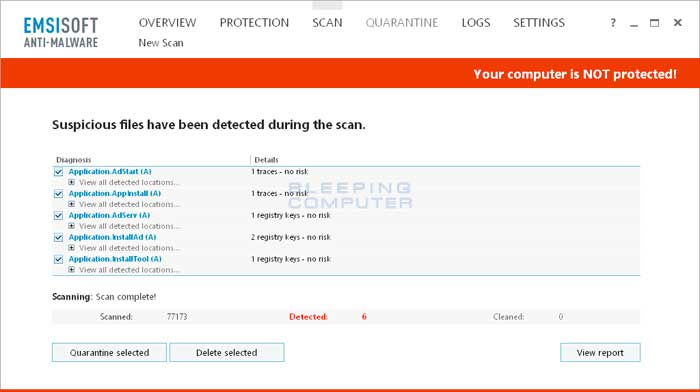
Now click on the Quarantine Selected button, which will remove the infections and place them in the program's quarantine. You will now be at the last screen of the Emsisoft Anti-Malware setup program, which you can close. If Emsisoft prompts you to reboot your computer to finish the clean up process, please allow it to do so. Otherwise you can close the program.
At this point you should download Zemana AntiMalware, or ZAM, in order to scan your computer for any any infections, adware, or potentially unwanted programs that may be present. Please download Zemana AntiMalware from the following location and save it to your desktop:

Zemana AntiMalware
Once downloaded, close all programs and open windows on your computer.
Now double-click on the icon on your desktop named Zemana.AntiMalware.Setup.exe. This will start the installation of Zemana AntiMalware onto your computer.
When the installation begins, keep following the prompts in order to continue with the installation process. Do not make any changes to default settings and when the program has finished installing, Zemana will automatically start and display the main screen.
You will now be at the main screen for Zemana AntiMalware as shown below.
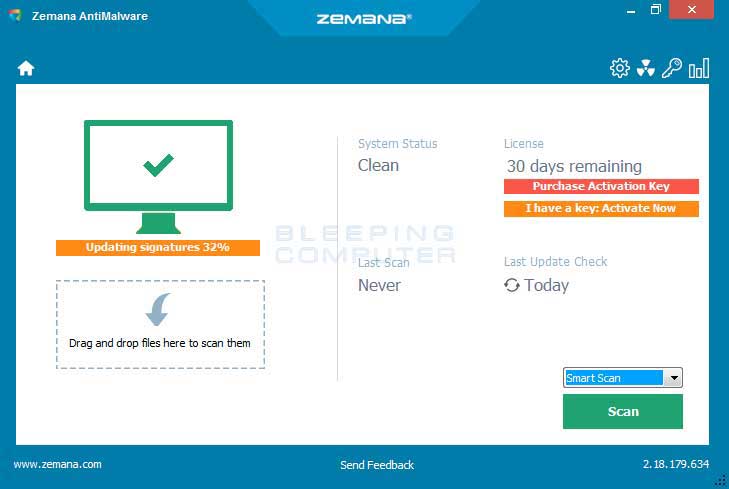
Above the Scan button, please change the scan type to Deep Scan and then click on the Scan button to start the malware removal scan.
Zemana AntiMalware will now start scanning your computer for malware, adware, and potentially unwanted programs. This process can take quite a while, so we suggest you do something else and periodically check on the status of the scan to see when it is finished.
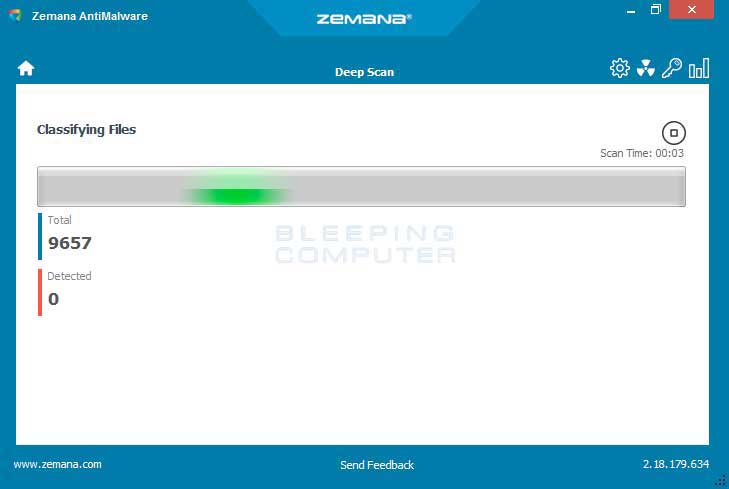
When Zemana has finished finished scanning it will display a screen that displays any programs that have been detected. Please note that the items found may be different than what is shown in the image below.
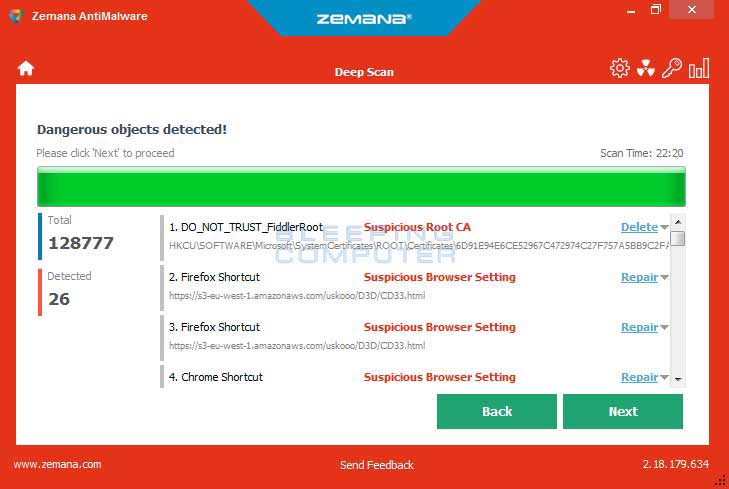
Review the scan results and when you are ready to continue with the cleanup process, click on the Next button to delete or repair all of the the selected results. Once you click on the Next button, Zemana will remove any unwanted files and fix any modified legitimate files. If you receive a warning that Zemana needs to close your open browsers, please close any web browsers that may be open and then click on the OK button to continue.
Zemana will now create a System Restore Point and remove the detected files and repair any files that were modified.
When the process is complete, you will be shown a screen that says Completed. At this screen, you can now close the Zemana AntiMalware screen and continue with the rest of the instructions.
Now please download AdwCleaner and save it to your desktop. AdwCleaner will scan your computer for adware programs that may have been installed on your computer without your knowledge. You can download AdwCleaner from the following URL:

AdwCleaner
When AdwCleaner has finished downloading, please double-click on the AdwCleaner.exe icon that now appears on your desktop. Once you double-click on the icon the AdwCleaner program will open and you will be presented with the program's license agreement. After you read it, click on the I agree button if you wish to continue. Otherwise, click on the I disagree button to close the program. If Windows prompts you as to whether or not you wish to run AdwCleaner, please allow it to run.
If you selected to continue, you will be presented with the start screen as shown below.
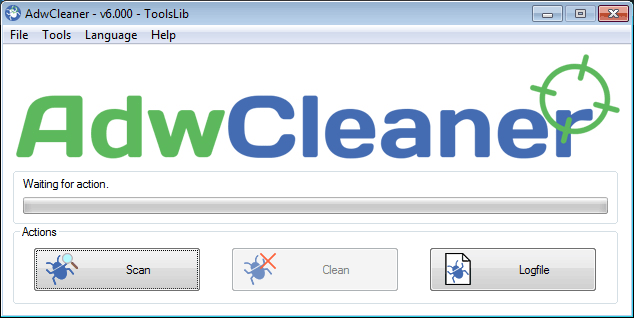
Now click on the Scan button in AdwCleaner. The program will now start to search for known adware programs that may be installed on your computer. When it has finished it will display all of the items it has found in Results section of the screen above. Please look through the results and try to determine if the programs that are listed contain ones that you do not want installed. If you find programs that you need to keep, then uncheck the entries associated with them.
For many people, the contents of the Results section may appear confusing. Unless you see a program name that you know should not be removed,please continue with the next step.
To remove the adware programs that were detected in the previous step, please click on the Clean button on the AdwCleaner screen. AdwCleaner will now prompt you to save any open files or data as the program will need to close any open programs before it starts to clean.
Please save your work and then click on the OK button. AdwCleaner will now delete all detected adware from your computer. When it is done it will display an alert that explains what PUPs (Potentially Unwanted Programs) and Adware are. Please read through this information and then press the OK button. You will now be presented with an alert that states AdwCleaner needs to reboot your computer.
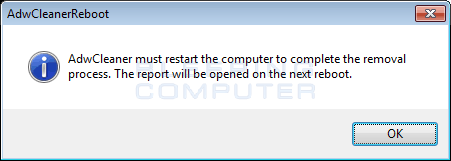
Please click on the OK button to let AdwCleaner reboot your computer.
When your computer reboots and you are logged in, AdwCleaner will automatically open a log file that contains the files, registry keys, and programs that were removed from your computer.
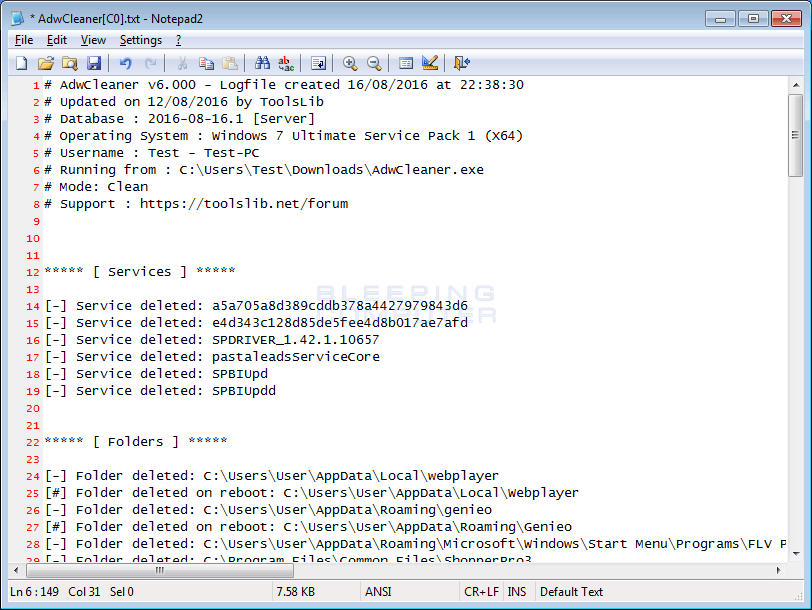
Please review this log file and then close the Notepad Window.
If you are still having problems with Adware then you should also reset your browsers back to their default configuration. Please note that this method will remove all add-ons, extensions, toolbars and other customizations but will leave your bookmarks and favorites intact.
For each browser that you have installed on your computer, please click on the browsers icon below and follow the displayed steps to reset that browser.
In order to remove Adware completely you will need to reset Chrome back to its initial settings. Doing these steps will erase all configuration information from Chrome such as your home page, tab settings, saved form information, browsing history, and cookies. This process will also disable any installed extensions. All of your bookmarks, though, will be preserved.
To reset Chrome, open the program and click on the Chrome menu button (![]() ) in the top right-hand corner of the window. This will open the main menu for Chrome as shown below.
) in the top right-hand corner of the window. This will open the main menu for Chrome as shown below.
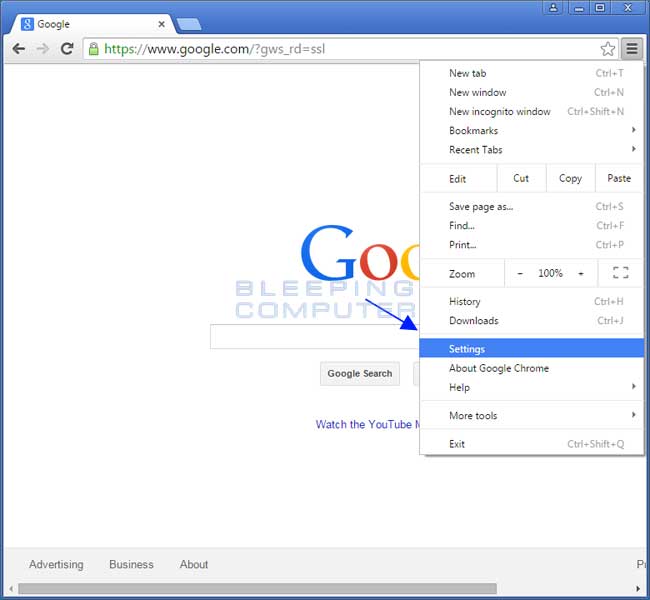
Now click on the menu option labeled Settings as shown by the arrow in the picture above, which will open the basic settings screen. Scroll down to the very bottom and you will see a Show advanced settings... option as shown in the image below.
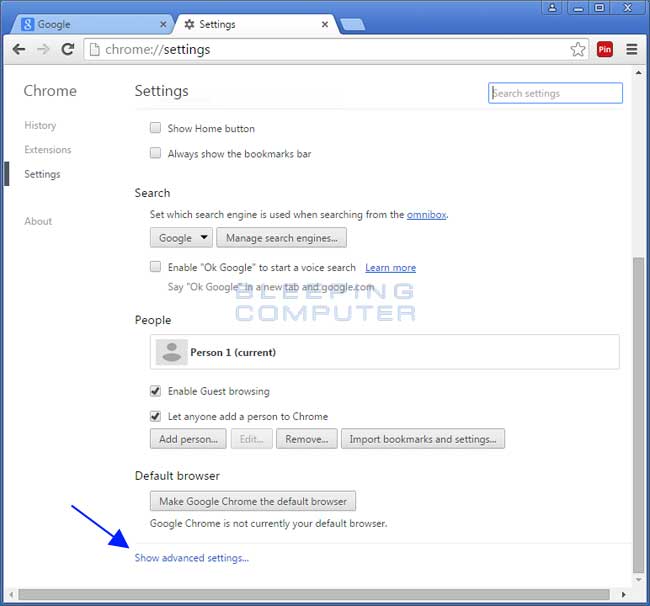
Click on the Show advanced settings... option to open the advanced settings screen. Scroll to the very bottom until you see the reset button as shown in the image below.

Now click on the Reset settings button as shown in the image above. Chrome will now open a confirmation dialog asking if you are sure you wish to reset your browser.

To reset Chrome, click on the Reset button. Chrome will now erase all your personal data, browsing history, and disable all installed extensions. Your bookmarks, though, will remain intact and still be accessible. You can now close the Settings tab and continue with the rest of the instructions.
In order to remove Adware completely you will need to reset Internet Explorer back to its initial settings. Doing these steps will erase all configuration information from Internet Explorer such as your home page, saved form information, browsing history, and cookies. This process will also disable any installed toolbars and add-ons. All of your bookmarks, though, will be preserved.
To reset Internet Explorer, open the program and click on the Internet Explorer menu button (![]() ) in the top right-hand corner of the window. This will open the main menu for Internet Explorer as shown below.
) in the top right-hand corner of the window. This will open the main menu for Internet Explorer as shown below.
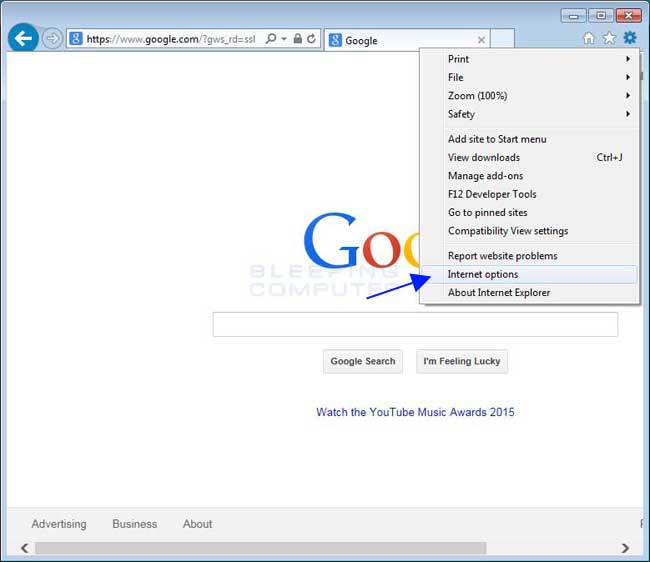
Now click on the menu option labeled Internet options as shown by the arrow in the picture above, which will open the Internet Options screen.
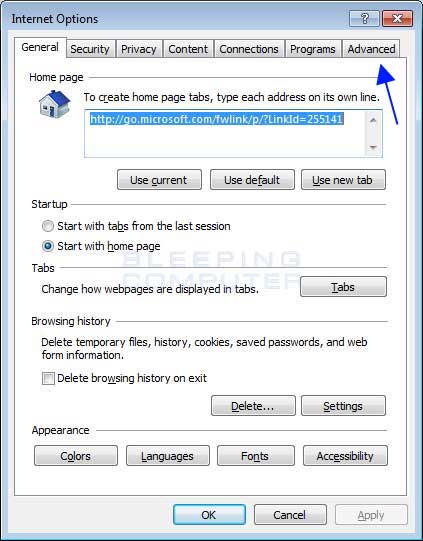
Now click on the Advanced tab as shown in the image above. This will open the Advanced Settings screen.
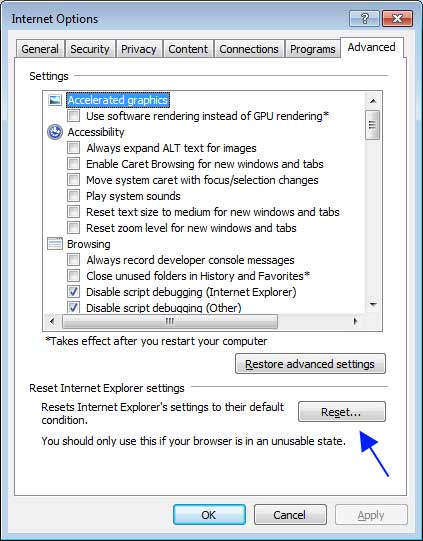
Now click on the Reset... button as shown in the image above. Internet Explorer will now open a confirmation dialog asking you to confirm that you wish to reset your browser.
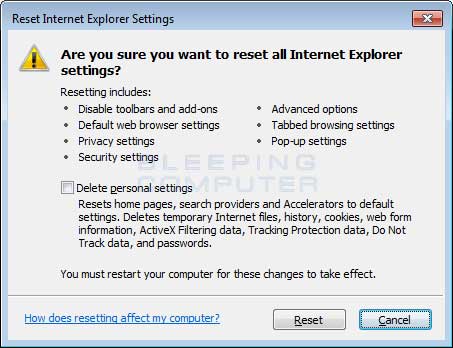
In the reset dialog shown above, please put a check mark in Delete personal settings and then click on the Reset button. Internet Explorer will now erase all your personal data, browsing history, and disable all add-ons and toolbars. Your favorites, though, will remain intact and still be accessible.
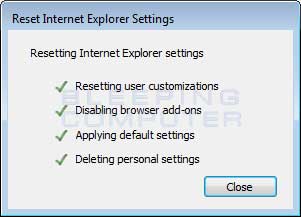
Once the Reset process has been completed, click on the Close button. You will now be prompted to restart Internet Explorer to complete the reset. Once you have restarted Internet Explorer, you can continue with the rest of the instructions.
In order to remove Adware completely you will need to refresh Firefox back to its initial settings. It does this by removing all add-ons and personalized configuration settings. All of your bookmarks, though, will be preserved.
To reset Firefox, open the program and click on the Firefox menu
button (![]() ) in the top right-hand corner of the window. This will open the main menu for Firefox as shown below.
) in the top right-hand corner of the window. This will open the main menu for Firefox as shown below.
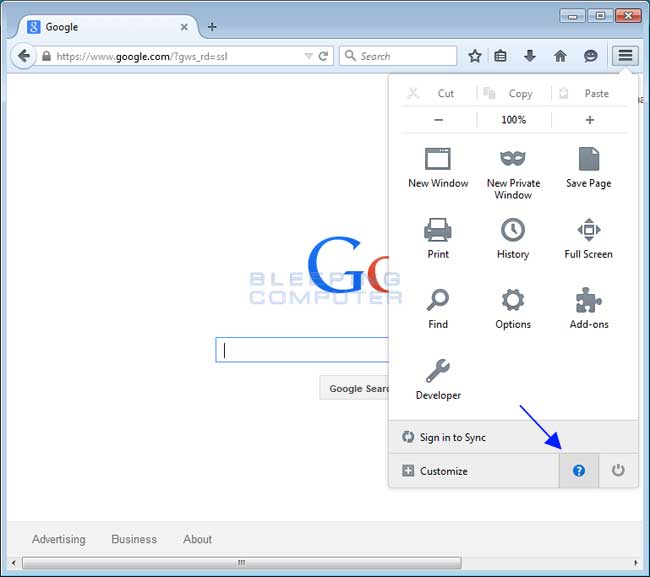
Now click on the question mark button (![]() ) as indicated by the arrow in the image above. This will open up the Firefox help menu.
) as indicated by the arrow in the image above. This will open up the Firefox help menu.
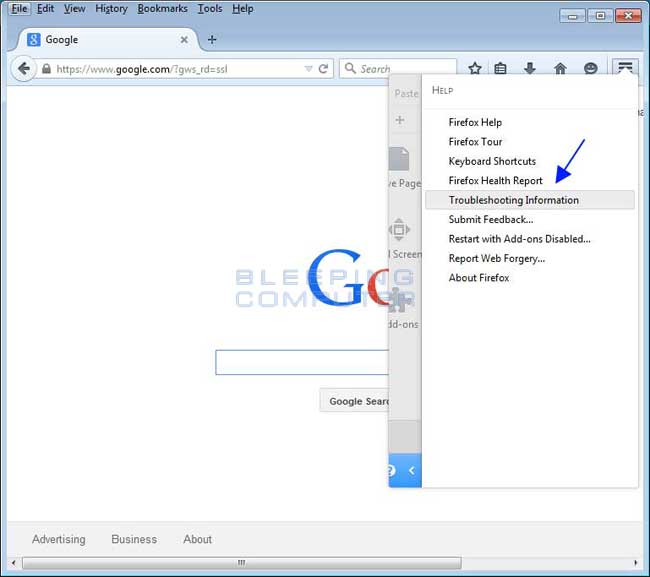
Next click on the Troubleshooting Information option as indicated by the arrow in the image above. This will bring you to a Troubleshooting page.

To begin the refresh process click on the Refresh Firefox.. button. When you do this a confirmation will be shown asking if you wish to perform a Firefox refresh.

To refresh Firefox, click on the Refresh Firefox button. When the refresh process is finished you will be shown an Import window that will automatically close. When that closes, Firefox will be open and state that it has been refreshed.
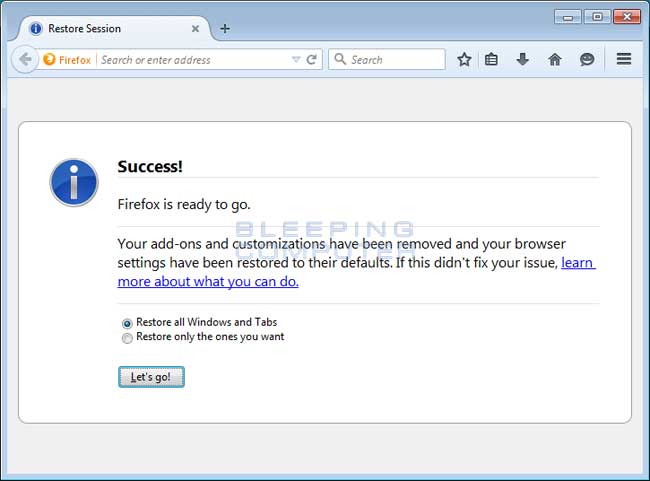
You can now click on the Let's go! button to start using Firefox again.
In order to completely remove Adware you will need to reset Safari back to its initial settings. Doing these steps will erase all configuration information from Safari such as your Top Sites, saved form information, browsing history, and cookies. This process will not erase your bookmarks or extensions, which will still be available after you reset Safari.
To reset Safari, open the program and click on the gear (![]() ) in the top right-hand corner of the window. This will open the main menu for Safari as shown below.
) in the top right-hand corner of the window. This will open the main menu for Safari as shown below.
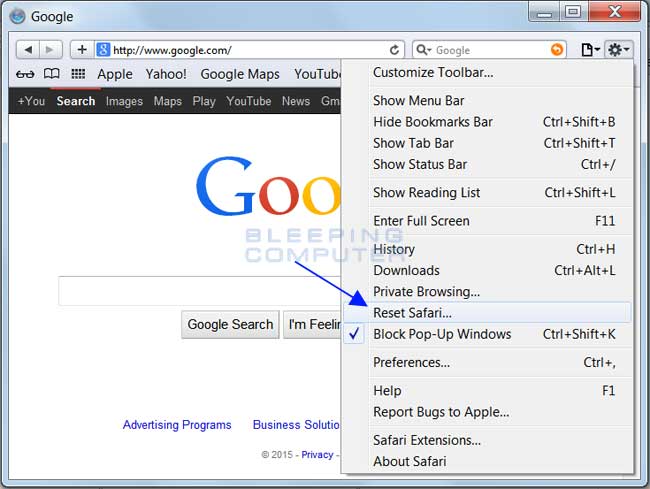
Now click on the menu option labeled Reset Safari as shown by the arrow in the picture above. This will open a window that allows you to select all the items you wish to reset.
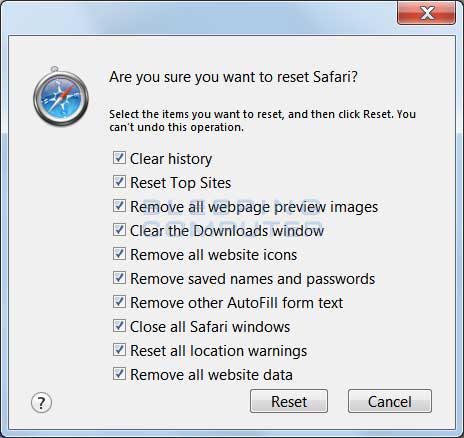
Keep the check marks in each option and then click on the Reset button. Safari will delete all of your personal data and then open a blank page, which means the process has finished.
It is important to note that this process does not delete your Bookmarks or any installed Safari Extensions. If you wish to remove your Safari Extensions as well, you can download this batch file, which will reset Safari and delete all installed extensions, while still retaining your bookmarks.
As many malware and unwanted programs are installed through vulnerabilities found in out-dated and insecure programs, it is strongly suggested that you use Secunia PSI to scan for vulnerable programs on your computer. A tutorial on how to use Secunia PSI to scan for vulnerable programs can be found here:
How to detect vulnerable and out-dated programs using Secunia Personal Software Inspector
Your computer should now be free of the Adware program. If your current security solution allowed this program on your computer, you may want to consider purchasing the full-featured version of Malwarebytes Anti-Malware to protect against these types of threats in the future.
If you are still having problems with your computer after completing these instructions, then please follow the steps outlined in the topic linked below:
Preparation Guide For Use Before Using Malware Removal Tools and Requesting Help
Are Your Protected?
While Malwarebytes Anti-Malware, Emsisoft Anti-Malware & Zemana AntiMalware will scan and clean a computer for free, the free versions do not offer real-time protection. If you want to be fully protected at all times then it is recommended that you purchase a premium version.
Malwarebytes Anti-Malware
Purchase the full-featured version of Malwarebytes Anti-Malware, which includes real-time protection, scheduled scanning, and website filtering, to protect yourself against these types of threats in the future!
Emsisoft Anti-Malware
Purchase the full-featured version of Emsisoft Anti-Malware, which includes real-time protection and behavior blocker, to protect yourself against these types of threats in the future!
Zemana AntiMalware
Purchase the full-featured version of Zemana AntiMalware, which includes second opinion malware scanner when other solutions do not work, cloud scanning, and super-fast scan time, to protect yourself against these types of threats in the future!
Disclaimer: While we do earn a commission from the sale of the above products, rest assured we only recommend them due to their effectiveness.


